
Thurso is a town and former burgh on the north coast of the Highland council area of Scotland. Situated in the historical County of Caithness, it is the northernmost town on the island of Great Britain. From a latitudal standpoint, Thurso is located further north than the southernmost point of Norway and in addition lies more than 500 miles (800 km) north of London.

Caithness is a historic county, registration county and lieutenancy area of Scotland.

Dounreay is a small settlement and the site of two large nuclear establishments on the north coast of Caithness in the Highland area of Scotland. It is on the A836 road nine miles west of Thurso.
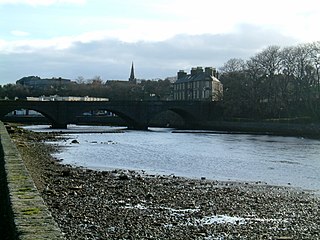
Wick is a town and royal burgh in Caithness, in the far north of Scotland. The town straddles the River Wick and extends along both sides of Wick Bay. "Wick Locality" had a population of 6,954 at the time of the 2011 census, a decrease of 3.8% from 2001.

Reay is a village which has grown around Sandside Bay on the north coast of the Highland council area of Scotland. It is within the historic Parish of Reay and the historic county of Caithness.

Reay Parish Church is a Church of Scotland parish church serving Reay, Caithness. It is one of the most northerly communities on the Scottish mainland, located several miles to west of Thurso. The largest local employer is the Dounreay nuclear facility.
Thurso High School in Thurso, Caithness, Scotland, is the most northerly secondary school on mainland Great Britain.

Georgemas Junction railway station is a railway station located in the Highland council area in the far north of Scotland. It serves several rural hamlets in the historic county of Caithness, including Georgemas, Roadside and Banniskirk. It is also the nearest station to the village of Halkirk, which lies approximately 1.6 miles (2.6 km) west of the station.
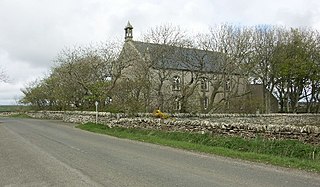
Bower is a village and civil parish in Highland, Scotland It is 10 miles from Thurso and around 11 miles from Wick. Bower is served by Wick, Thurso and Castletown for shopping, taxis and post offices.

Nucleus, the Nuclear and Caithness Archives is the national archive of the British civil nuclear industry and the archive for the County of Caithness. The archives were constructed by the Nuclear Decommissioning Authority (NDA) and opened in 2017. Work continues at the facility to bring together all of the NDA's archive material from 16 separate sites. The Caithness county archives, dating from 1589 are also held at the site.

Inverness Town House is a municipal building in the High Street, Inverness, Scotland. The town hall, which was the headquarters of Inverness Burgh Council, is a Category A listed building.

Llanidloes Town Hall is a municipal building in Great Oak Street, Llanidloes in Powys, Wales. The structure, which is the meeting place of Llanidloes Town Council as well as the home of the Llanidloes Museum and the Llanidloes Public Library, is a Grade II listed building.

Banchory Town Hall is a municipal structure in the High Street, Banchory, Aberdeenshire, Scotland. The structure is primarily used as a community events venue.

Kinross Town Hall forms part of a complex of municipal buildings in the High Street, Kinross, Perth and Kinross, Scotland. The town hall, which has been converted for residential use, is a Category B listed building.
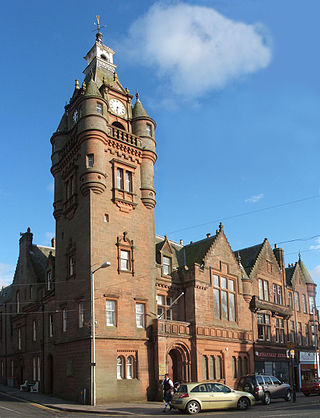
Lockerbie Town Hall is a municipal building in the High Street in Lockerbie, Dumfries and Galloway, Scotland. The structure, which is used as a venue for the provision of local services, is a Category A listed building.
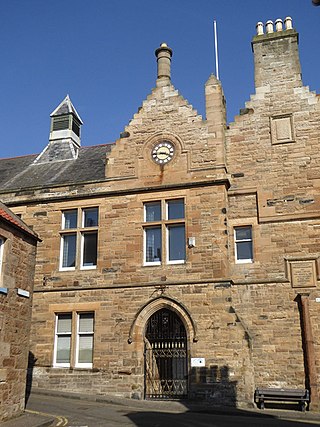
Cellardyke Town Hall is a municipal structure in Tolbooth Wynd, Cellardyke, Fife, Scotland. The building accommodates a local history museum and is also used as a local events venue. The mercat cross, which has been affixed to the front of the building, is a Category B listed structure.

Wick Town Hall is a municipal building in Bridge Street, Wick, in the Highland area of Scotland. The structure, which is used as a community events venue, is a Category B listed building.
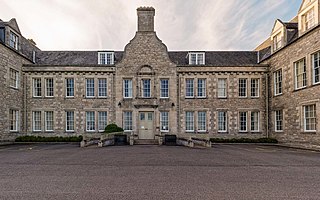
Drummuie, formerly Golspie Technical School, is a municipal structure in Drummuie Terrace, Golspie, Highland, Scotland. The complex, which was the headquarters of Sutherland County Council and is currently used as council offices for The Highland Council, is a Category B listed building.

County Offices, formerly Stafford Place, is a municipal structure in the High Street, Wick, Caithness, Scotland. The façade of the building, which was the headquarters of Caithness County Council and is currently used as a customer service point by The Highland Council, is a Category B listed building.

Wick Sheriff Court is a judicial structure in Bridge Street, Wick, Caithness, Scotland. The structure, which remains in use as a courthouse, is a Category B listed building.




















